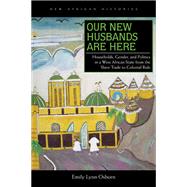Our New Husbands Are Here
, by Osborn, Emily Lynn- ISBN: 9780821419830 | 0821419838
- Cover: Paperback
- Copyright: 10/15/2011
In Our New Husbands Are HereEmily Lynn Osborn makes a significant contribution to our understanding of the role of gender in precolonial and colonial Africa. Well written and meticulously researched, this important book shows that women assumed a critical if understudied role in the precolonial state of Baté, in present-day Guinea. Osborn also reveals that the gender biases implicit in the French colonial project radically diminished women's political roles and created new opportunities and burdens for colonized men. Osborn traces these processes to the seventeenth century, when a group of Muslim migrants arrived in the Milo River Valley, in the interior savannas of West Africa. Those men and women used their households to lay the foundations of the state of Baté. Over the next two centuries, Baté's elites combined household-making and state-making to endure the predations of the transatlantic slave trade, build a vital urban economic hub, and dissolve external political and military threats. But Baté's leaders proved unable to fend off the French, who colonized the region in the late nineteenth century and introduced a new method of statecraft, one that sought to separate the household from the state. By investigating the relationship between household-making and state- making, Our New Husbands Are Heregenerates a nuanced perspective on power in precolonial and colonial Africa and shows that previous studies have overlooked the shifting role of women and the domestic sphere in West African political history.







